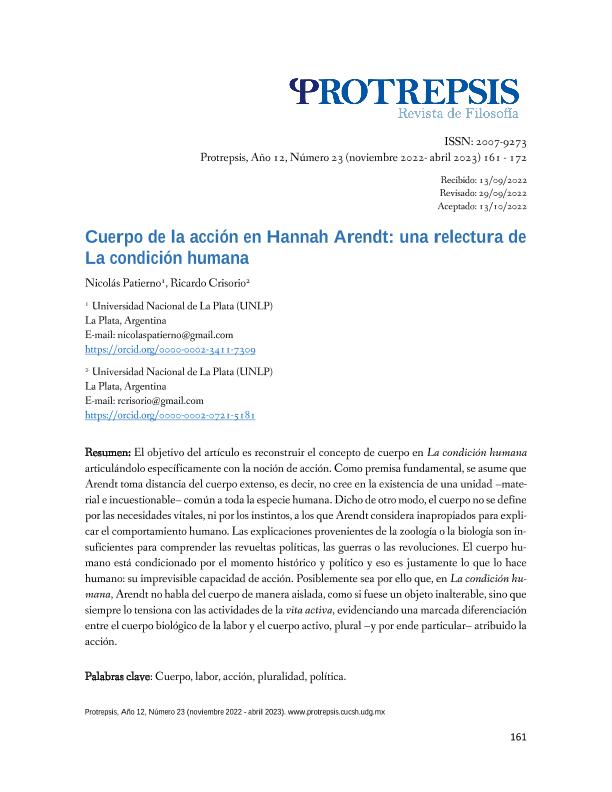Mostrar el registro sencillo del ítem
dc.contributor.author
Patierno, Nicolas

dc.contributor.author
Crisorio, Ricardo Luis

dc.date.available
2023-09-15T15:40:55Z
dc.date.issued
2022-11
dc.identifier.citation
Patierno, Nicolas; Crisorio, Ricardo Luis; Cuerpo de la acción en Hannah Arendt: una relectura de La condición humana; Universidad de Guadalajara. Centro Universitario de Ciencias Sociales y Humanidades. Departamento de Filosofía; Protrepsis; 23; 11-2022; 161-172
dc.identifier.uri
http://hdl.handle.net/11336/211698
dc.description.abstract
El objetivo del artículo es reconstruir el concepto de cuerpo en La condición humana articulándolo específicamente con la noción de acción. Como premisa fundamental, se asume que Arendt toma distancia del cuerpo extenso, es decir, no cree en la existencia de una unidad –material e incuestionable– común a toda la especie humana. Dicho de otro modo, el cuerpo no se define por las necesidades vitales, ni por los instintos, a los que Arendt considera inapropiados para explicar el comportamiento humano. Las explicaciones provenientes de la zoología o la biología son insuficientes para comprender las revueltas políticas, las guerras o las revoluciones. El cuerpo humano está condicionado por el momento histórico y político y eso es justamente lo que lo hace humano: su imprevisible capacidad de acción. Posiblemente sea por ello que, en La condición humana, Arendt no habla del cuerpo de manera aislada, como si fuese un objeto inalterable, sino que siempre lo tensiona con las actividades de la vita activa, evidenciando una marcada diferenciación entre el cuerpo biológico de la labor y el cuerpo activo, plural –y por ende particular– atribuido la acción.
dc.description.abstract
The objective of the article is to reconstruct the concept of body in The Human Condi- tion, articulating it specifically with the notion of action. As a fundamental premise, it is assumed that Arendt distances herself from the extensive body, that is, she does not believe in the existence of a unity –material and unquestionable– common to the entire human species. In other words, the body is not defined by vital needs, nor by instincts, which Arendt considers inappropriate to ex- plain human behavior. Explanations from zoology or biology are insufficient to understand politi- cal upheavals, wars or revolutions. The human body is conditioned by the historical and political moment and that is precisely what makes it human: its unpredictable capacity for action. It is pos- sibly for this reason that, in The Human Condition, Arendt does not speak of the body in isolation as if it were an unalterable object, but always associate it with the activities of the vita activa, evi- dencing a marked differentiation between the biological body of the work and the body of action, which is plural, and therefore particular.
dc.format
application/pdf
dc.language.iso
spa
dc.publisher
Universidad de Guadalajara. Centro Universitario de Ciencias Sociales y Humanidades. Departamento de Filosofía
dc.rights
info:eu-repo/semantics/openAccess
dc.rights.uri
https://creativecommons.org/licenses/by-nc-sa/2.5/ar/
dc.subject
CUERPO
dc.subject
ACCIÓN
dc.subject
PLURALIDAD
dc.subject
POLÍTICA
dc.subject.classification
Otras Humanidades

dc.subject.classification
Otras Humanidades

dc.subject.classification
HUMANIDADES

dc.title
Cuerpo de la acción en Hannah Arendt: una relectura de La condición humana
dc.type
info:eu-repo/semantics/article
dc.type
info:ar-repo/semantics/artículo
dc.type
info:eu-repo/semantics/publishedVersion
dc.date.updated
2023-07-06T21:34:14Z
dc.identifier.eissn
2007-9273
dc.journal.number
23
dc.journal.pagination
161-172
dc.journal.pais
México

dc.journal.ciudad
Guadalajara
dc.description.fil
Fil: Patierno, Nicolas. Consejo Nacional de Investigaciones Científicas y Técnicas. Centro Científico Tecnológico Conicet - La Plata. Instituto de Investigaciones en Humanidades y Ciencias Sociales. Universidad Nacional de La Plata. Facultad de Humanidades y Ciencias de la Educación. Instituto de Investigaciones en Humanidades y Ciencias Sociales; Argentina
dc.description.fil
Fil: Crisorio, Ricardo Luis. Consejo Nacional de Investigaciones Científicas y Técnicas. Centro Científico Tecnológico Conicet - La Plata. Instituto de Investigaciones en Humanidades y Ciencias Sociales. Universidad Nacional de La Plata. Facultad de Humanidades y Ciencias de la Educación. Instituto de Investigaciones en Humanidades y Ciencias Sociales; Argentina
dc.journal.title
Protrepsis
dc.relation.alternativeid
info:eu-repo/semantics/altIdentifier/url/http://www.protrepsis.cucsh.udg.mx/index.php/prot/article/view/404
dc.relation.alternativeid
info:eu-repo/semantics/altIdentifier/url/https://doi.org/10.32870/prot.i23.404.
Archivos asociados
